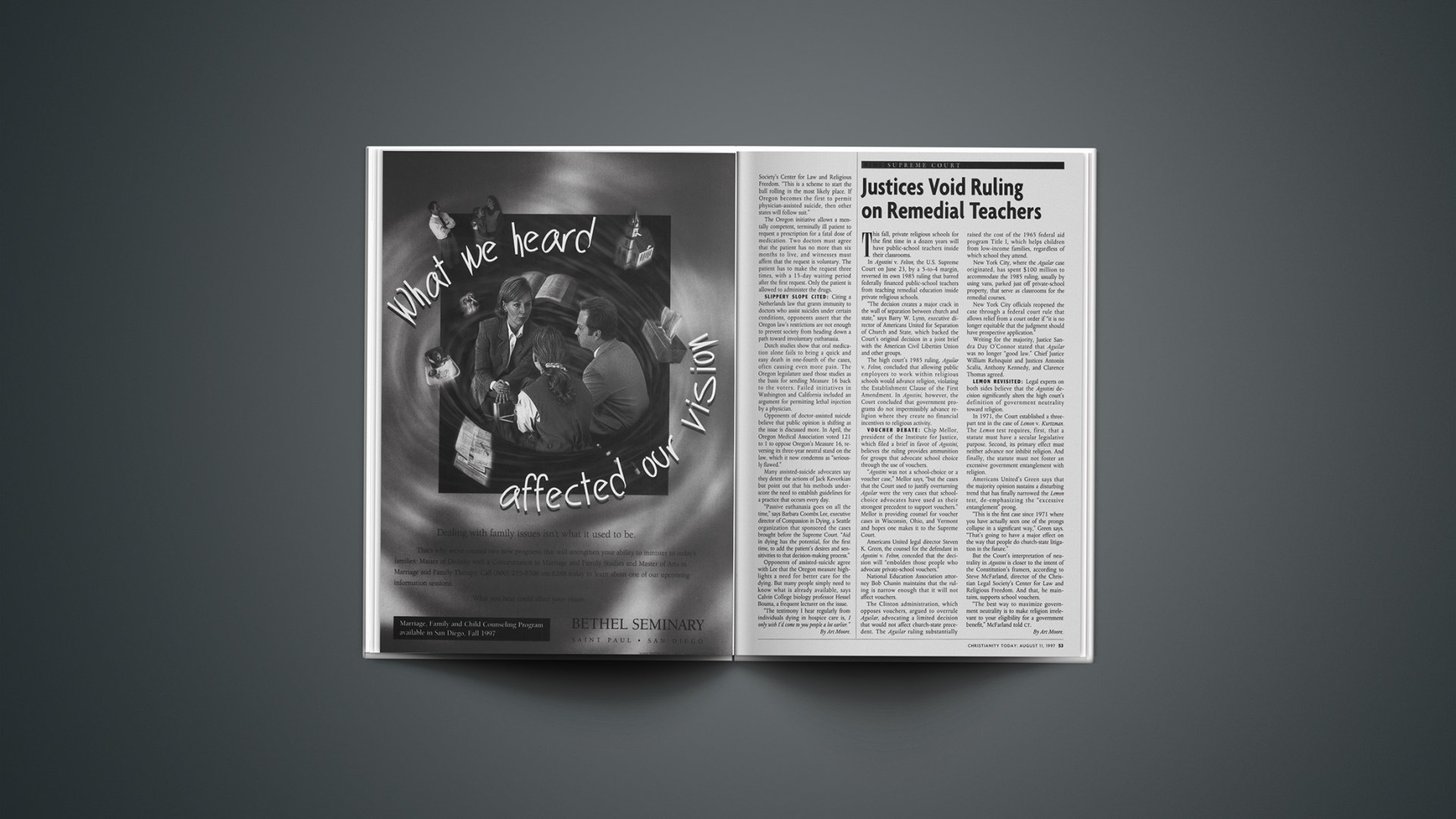This fall, private religious schools for the first time in a dozen yearswill have public-school teachers inside their classrooms.
In Agostini v. Felton, the U.S. Supreme Courton June 23, by a 5-to-4 margin, reversed its own 1985 ruling that barredfederally financed public-school teachers from teaching remedial educationinside private religious schools.
“The decision creates a major crack in the wall of separation between churchand state,” says Barry W. Lynn, executive director of Americans United forSeparation of Church and State, which backed the Court’s original decisionin a joint brief with the American Civil Liberties Union and other groups.
The high court’s 1985 ruling, Aguilar v. Felton,concluded that allowing public employees to work within religious schoolswould advance religion, violating the Establishment Clause of the FirstAmendment. In Agostini, however, the Court concluded that government programsdo not impermissibly advance religion where they create no financial incentivesto religious activity.
VOUCHER DEBATE: Chip Mellor, president of the Institute for Justice,which filed a brief in favor of Agostini, believes the rulingprovides ammunition for groups that advocate school choice through the useof vouchers.
“Agostini was not a school-choice or a voucher case,” Mellorsays, “but the cases that the Court used to justify overturningAguilar were the very cases that school-choice advocates haveused as their strongest precedent to support vouchers.” Mellor is providingcounsel for voucher cases in Wisconsin, Ohio, and Vermont and hopes one makesit to the Supreme Court.
Americans United legal director Steven K. Green, the counsel for the defendantin Agostini v. Felton, conceded that the decisionwill “embolden those people who advocate private-school vouchers.”
National Education Association attorney Bob Chanin maintains that the rulingis narrow enough that it will not affect vouchers.
The Clinton administration, which opposes vouchers, argued to overruleAguilar, advocating a limited decision that would not affectchurch-state precedent. The Aguilar ruling substantially raisedthe cost of the 1965 federal aid program Title I, which helps children fromlow-income families, regardless of which school they attend.
New York City, where the Aguilar case originated, has spent$100 million to accommodate the 1985 ruling, usually by using vans, parkedjust off private-school property, that serve as classrooms for the remedialcourses.
New York City officials reopened the case through a federal court rule thatallows relief from a court order if “it is no longer equitable that the judgmentshould have prospective application.”
Writing for the majority, Justice Sandra Day O’Connor stated thatAguilar was no longer “good law.” Chief Justice William Rehnquistand Justices Antonin Scalia, Anthony Kennedy, and Clarence Thomas agreed.
LEMON REVISITED: Legal experts on both sides believe that theAgostini decision significantly alters the high court’s definitionof government neutrality toward religion.
In 1971, the Court established a three-part test in the case ofLemon v. Kurtzman. The Lemon testrequires, first, that a statute must have a secular legislative purpose.Second, its primary effect must neither advance nor inhibit religion. Andfinally, the statute must not foster an excessive government entanglementwith religion.
Americans United’s Green says that the majority opinion sustains a disturbingtrend that has finally narrowed the Lemon test, de-emphasizing the “excessiveentanglement” prong.
“This is the first case since 1971 where you have actually seen one of theprongs collapse in a significant way,” Green says. “That’s going to havea major effect on the way that people do church-state litigation in the future.”
But the Court’s interpretation of neutrality in Agostini iscloser to the intent of the Constitution’s framers, according to Steve McFarland,director of the Christian Legal Society’s Center for Law and Religious Freedom.And that, he maintains, supports school vouchers.
“The best way to maximize government neutrality is to make religion irrelevantto your eligibility for a government benefit,” McFarland toldCT.
Copyright © 1997 Christianity Today. Click for reprint information.










